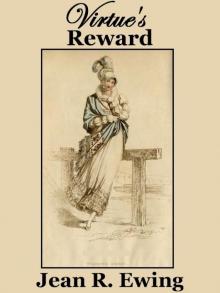- Home
- Jean R. Ewing
Valor's Reward
Valor's Reward Read online
VALOR'S REWARD
Jean R. Ewing
About the Author
Publishing Information
Her peerless feature, joined with her birth, approves her fit for none but for a king;
Her valiant courage and undaunted spirit, more than in women commonly is seen—
—King Henry VI, First Part
* * *
Prologue
Northumberland, 1807
The Cheviot Hills to the north lay mottled with shadow as a cavalcade of carriages and outriders swept across the moor toward the little stone bridge over the Whin. A handful of sheep stopped grazing to watch.
The horses clattered past the pebble-bedded stream without pausing and turned in at the peeling gates of Whinburn House. As the first coach with its emblazoned crest on the panel drew up before the sweep of steps, a dashing, dark-haired man in his fifties hurried down to greet it. He seemed to be torn between alarm and hilarity, but he was doing his best to assume an expression of devoted respect.
A very small, very upright old lady climbed stiffly from the chaise, and Sir Shelby Whinburn bowed over the knobby hand of his late wife’s aunt, Lady Emilia Shay, come to visit for the first time in thirteen years.
He was wearing his plum-colored coat, the one that hid the wine stains. The collar was twisted, since he had donned it in a hurry. Yet he kissed Lady Emilia’s proffered hand with a gallant flourish as they exchanged greetings.
“Whinburn is honored, ma’am. Yet we did not expect your ladyship until tomorrow. I trust your journey was everything that was comfortable?”
“On the contrary, it was appalling. I despise travel above all things—and to come so far north! Why, one would think one traveled back in time.”
Lady Emilia snapped open her parasol as the sun peeked out between the drifting clouds.
Sir Shelby waved vaguely in the direction of the lawn. “Pray, allow me to offer your ladyship some refreshment. On such a lovely day, perhaps you might like to take tea outside?”
“No, thank you, nephew.” He choked down panic for a moment, but then broke into a smile of undisguised relief as she went on. “I have been cooped up in my carriage these four hours past like a hen being taken to market. What I should like above all things is a stroll about your garden.”
The couple began to make a stately progress across the grass, away from the mossy stains on the walls from the broken guttering, away from the dirty, dust-covered windows, and away from everything that Sir Shelby Whinburn wanted to hide inside.
* * *
On the other side of the lawn, Jessica was oblivious to this untimely arrival. She had been distracted for a moment by the shriek of a hawk, but now she curled up her legs and reopened her book. The Northumbrian landscape disappeared as Achilles and Hector began to shout their boasts before the walls of Troy.
* * *
Sir Shelby offered one hand to his aunt, but with the other he was making frantic gesticulations behind her back. The faces of two servants appeared at the windows. The gestures were directed at them and were urgent instructions to hurry. Sir Shelby muttered some curses under his breath as Lady Emilia glanced back over her shoulder. Yet with a charming smile and a comment about the view, he distracted her and steered her toward the shrubbery.
“And where, pray, is the child, Jessica?” Lady Emilia asked after the immediate news had been exchanged. “My niece was a great beauty, Sir Shelby, lovely enough to ensnare you without any fortune, though heaven knows you could have used it. Since my income is in trust for my lifetime only, Jessica won’t get a penny from me. She had better marry well. I sincerely hope she has her mother’s looks.”
Sir Shelby’s brow contracted for a moment. He could see from the corner of his eye that Ben Cameron was desirous of climbing out of a downstairs window to join them. Two footmen were trying to persuade him to desist.
“Jessica has different coloring,” he said absently.
“Where is she? With her governess?”
He swallowed a grin as one of his servants grasped Ben by the back of his high collar and twisted him from the window, then Sir Shelby turned solemnly to his aunt by marriage. He was quite foxed himself.
“She’s only fifteen years old. I’ll not confine her to the house.”
Lady Emilia raised an eyebrow. “But Jessica is approaching the age when she should make her come out. She is my only great-niece, and I intend to see to it. Good Lord! What on earth is in that tree?”
“Oh,” Sir Shelby Whinburn said. He laughed. “It’s Jessica.”
And he shouted her name.
* * *
The glittering armies of Troy shimmered for a moment, like genies about to dissolve in smoke, then disappeared, taking Hector and Achilles with them.
Jessica glanced up, tossing her hateful plaits back over her shoulder. Papa and an old lady were staring up at her. Oh, good heavens! Was this her great-aunt, arrived a day early? When the gentlemen were still in the house!
She slipped from the branch that served as one of her favorite retreats and tried to curtsy. As her bare foot caught in the torn hem of her dress, the attempt failed so splendidly that she almost fell. She caught at the tree trunk and dropped the book. The spine cracked as loose pages scattered over the grass.
Jessica knelt and frantically began to gather them up. She had absolutely no idea what to say.
Lady Emilia was the first to recover. “Miss Jessica Whinburn? Where on earth are your shoes, child?”
Giving up any hope of rescuing her copy of the Iliad, Jessica stood up and curtsied again. Several errant pages skipped away across the grass in a small breeze. They were in the original Greek.
“I don’t know, but I’m not a child. I’m fifteen.”
Lady Emilia glowered up at Sir Shelby, her voice shaking with indignation. “Whatever are you thinking of, sir? You are laughing. The girl looks like a gypsy. She is as freckled as a hen’s egg. I declare I have never been more shocked. This is 1807, not the Middle Ages—to let a girl run around so! Good Lord, she is born to be a lady, not a fishwife.”
She turned back to Jessica. “Where is your governess?”
Jessica tilted her chin. It was a small gesture, but it betrayed both pride and discomfort. “I don’t have a governess.”
Sir Shelby tried to look solemn, for Ben Cameron was now waving to them from the top step of the house. The breeze blew his bright hair about his forehead.
“I have taught her myself, ma’am. She can ride and shoot better than half the boys in the neighborhood.”
“You have taught her to shoot? Good gracious, I might be in need of salts for the first time in sixty summers. Does she have no female companion?”
Sir Shelby shrugged. “There are women on the staff.”
“Servants? Nephew, I think you must be mad. Her mother has been dead these twelve years. The child will have to take her place in society. Good Lord, you don’t think what you’re about.”
Sir Shelby began to look stubborn. “She don’t need society. She’ll have Whinburn after I’m gone.”
“A ramshackle old house in the middle of the wilds, with nothing but sheep for company? It won’t wash, sir, and you know it. You think she can grow old here taking care of you? Nonsense! She must marry. She can’t spend the rest of her life running wild like a monkey. Without a mother, she needs the influence of a properly reared female. Look at her, sir! She must learn to keep out of the sun and apply lemon water daily.”
Not only was Sir Shelby feeling the effects of his wine, but he was also uncomfortably aware that he was in the wrong. Whinburn was mortgaged to the hilt. So he lost his temper.
“Next you’ll tell me that her hair won’t do! Well, there’s many a border lord proud of such a head. Don’t
think to come to Northumbria and disparage red hair! I’ve no time for fashion and folderol and women who faint at the sight of a mouse.”
Lady Emilia Shay had never fainted in her life. She drew herself up and fixed the handsome features with an angry blue stare.
“I am outraged, sir. Send the girl to me in London. She can go to school.”
“She’ll not leave this house while I’m alive, ma’am.”
“Then I shall send a suitable governess here.”
“I’ll turn the wench off.”
“You shall not. I’ll send another.”
He leered at her outrageously. “If you do, I’ll ruin her.”
Jessica turned scarlet. Spinning away from her father and great-aunt, she raced toward the house.
Ben Cameron was waiting at the bottom of the stair. He grinned with open charm and swept her a slightly unsteady bow.
“Well, now, Miss Jessica,” he said. “No need to fly into the boughs. It’s only an old lady. Find a clean dress and put your hair up, then go and tell your Papa that everyone’s gone out the back way, the dice and cards are cleared away, and we’ll be happy to offer her ladyship tea in the drawing room. Then I’ll give you a kiss for your pains, shall I?”
Face burning, Jessica pushed past him and watched from an upstairs window as her great-aunt and her father faced each other in the garden.
Tea was not to be served. With a final, violent gesture Lady Emilia Shay spun about and stalked back to the carriages. The horses had not yet been unharnessed.
Jessica knew both despair and anger as the entire cavalcade swept away, out of the gates, and back across the Whin.
* * *
Chapter 1
March, 1815
Michael Dechardon Grey, eighth Earl of Deyncourt, was contemplating marriage with very much the same cool, amused indifference that he and Charles de Dagonet had once shared when ambushed by a group of French soldiers in Spain.
Of course, that time he had escaped.
His lips curved into a smile of faintly sardonic self-derision.
With only one manservant riding close at his heels, Deyncourt was traveling rapidly north on his bay charger, directly into the teeth of a spring storm. It was not the style expected of an earl, and it would very much have surprised his London acquaintance to learn that the exquisite Lord Deyncourt could have so little patience with appearances. No doubt his future bride, whose tastes were going to prove both tiresome and expensive, would disapprove.
Nevertheless, he had traveled often enough in worse conditions in the Peninsula. He narrowed his eyes and turned up his collar. It had begun to snow.
A wavering twinkle of light beckoned through the swirling flakes. The Swan, at last! He was halfway to Tresham.
Deyncourt left his man to see to the baiting of their horses and strode into the parlor. He ordered a brandy, before turning to join his fellow travelers at the fireplace. A dark-haired gentleman at a table in the corner glanced up from his newspaper, then stood to hold out his hand.
“Good God! That notorious member of the Iron Duke’sjeunesse dorée, Michael Grey—or Lord Deyncourt, I should say, shouldn’t I? Enchanté!”
The earl grinned and shook his friend’s hand. “Devil Dagonet, in person? Dear God, I was just thinking of you, sir, and of a certain Iberian village, best forgotten except for a dazzling display of French swordsmanship.”
“Merely la ruse de guerre,” Dagonet replied with some amusement. The swordsmanship had been his, of course, learned as a boy from his émigré French father. “But if I remember, your role in our escape was every bit as wicked. So what takes you from town, Deyncourt? I thought you had become an ornament to society and ravisher of hearts?”
The earl sat at the table and crossed long legs at the knee. He was quietly dressed, in charcoal coat and buff breeches, but every understated garment spoke of exquisite taste and perfect quality.
He laughed. “Hardly! Right now you find me on my weary way to Tresham, where my ward languishes in temporary banishment with only his mother for company.”
“Your ward?”
“Peter, the fledgling Lord Steal. His father left a refreshingly old-fashioned will. Peter remains in my care until he comes of age, which is six years away at five-and-twenty, or when he marries with my permission, if it comes sooner. His affairs are in a sad disorder, you understand. It’s a splendid irony that a person like myself is cast in such a gallant role, of course—but what the devil are you doing so far from home, sir? I thought you had married and come into your estates?”
“Kate stays in Exmoor, while I take care of some business for her father. I’m doubly sorry she’s not with me, for I’d like you to meet her and I miss her damnably.” Dagonet glanced keenly at his friend. A subtle tension lurked about the earl’s eyes and mouth. “‘Prince, thou art sad; get thee a wife, get thee a wife—’”
“Since I came into my brother’s title, I seem to be endlessly sought after with that end in view,” Deyncourt replied dryly. “Yet I have no wife as yet.”
“But rumor says you’ve had several wives since you returned from Spain—”
“Only a lonely widow, alas, and she has just remarried.”
“Yet surely now you’re a peer you must make a suitable match and provide your name with an heir?” Dagonet leaned back, playing with his glass, and kept his voice casual. “In Portugal there was enough sighing and fluttering to quench the candles whenever you entered a room. Having added consequence and wealth to a noble profile, I imagine ingénues are making fools of themselves over your eyelashes.”
Deyncourt gazed absently into the fire. “I’m not interested in innocents.”
Dagonet fired, quite deliberately, from ambush. “Yes, naive girls are not your style, are they, Lord Deyncourt?”
He had the empty satisfaction of seeing his shot find its mark. The earl’s head snapped up. He had gone white about the nostrils.
“Should they be? Since society is so damned determined to cast me as a leader of fashion, I do what I can to defend the chits from its worst cruelties, but I’m not going to marry one. How could I in honor ask any father to put his naive daughter into my hands?”
Dagonet recklessly pressed his advantage. “Yet I hear you have been paying marked attention to the Incomparable Melton, a lady of immaculate eligibility, and that your betrothal is expected any day.”
But Deyncourt had recovered his humor and his control, seemingly without effort. He turned his glass in long, supple fingers.
“Lady Honoria may be virginal,” he replied with the faintest mockery, “but she is not innocent.”
“So how does the Incomparable survive your absence from town?”
“Very easily. She doesn’t lack for admirers. No doubt she is missing the title a great deal more than the man while I am gone.”
“Good God! You are speaking to a man happily and deeply besotted with his wife, Deyncourt. Chacun à son goût, of course. But aren’t your years fighting Napoleon enough penance for that business with Lady Beaumont?”
The earl’s fingers tightened slightly on the stem of his glass. “You don’t let up, do you? Am I about to pay in blood for confiding in you, or shall I just grovel in humble penance on the floor?”
“I hope not, but you cannot spend your entire life living it down.”
“Yes, I can,” the earl replied, his voice full of insult. “It’s such an excellent exercise in self-control, don’t you think?”
Dagonet tossed the dregs of his wine into the fire, sparking a flash of blue flame. “There are some things in life that should not be so damned controlled. I hope to God that the female exists who can rattle that insufferable composure in which you put so much pride.”
The earl gave his friend the insolent smile—only thinly veiled with his vivid charm—that had once caused the Marquis of Thrawton to demand satisfaction and then stutter out an apology, instead.
“Unfortunately, sir, vainglory is all I have left. The Incomparable Melt
on has impeccable breeding and would make anyone an admirable countess. She won’t mind in the least how often I visit my mistress—when I find a new one.”
He stood and shrugged into his many-caped coat, then pulled on his gloves. His movements were elegant, graceful, and deadly.
“And if it had been anyone else who had shown the presumption to speak to me as you have just done, Dagonet, I should call him out—in spite of what happened six years ago. Furthermore, even if he had your skill with a blade, I should kill him.”
Yet Lord Deyncourt laughed and gave his friend a wink, before he strode from the room.
* * *
That the night was fit for neither man nor beast was the considered opinion of the earl’s manservant, Dover. He knew better, however, than to express himself on the issue. It was snowing ever harder—a thick, wet, spring snow. The road had become almost impassable. Thank God the chaise and four with the Deyncourt arms emblazoned on the door had been left in London. Thank God these woods marked the edge of young Lord Steal’s estates. But what the devil had his master been thinking to travel on in such weather, when they could have spent a comfortable night at the Swan?
Michael was well aware of Dover’s misgivings, though he preferred not to admit—even to himself—that he had only pressed on to Tresham because of his meeting with Dagonet. The man was one of his oldest friends, for God’s sake! His concern struck deep. Nevertheless, when he returned to London he would propose to Lady Honoria Melton, with her spun-gold hair and velvet eyes. If he really had the self-control his situation demanded, he would have done so months ago.
His bay snorted, flung up its head, and shied.
The earl brought his mount to a halt. Dover stopped dead behind him.
A carriage blocked the road ahead, its wheels sunk in the mud.
A team of matched grays stood hanging their heads in their collars. They were blowing and trembling, their coats darkened with sweat, their rumps marked with streaks. The coachman had obviously been applying the whip in an attempt to get the horses to move, but now he sat with the reins looped in the guard, and his hands above his head. Several other servants stood in the snow and also reached their hands to the clouds.

 Rogue's Reward
Rogue's Reward Scandal's Reward
Scandal's Reward Valor's Reward
Valor's Reward Folly's Reward
Folly's Reward Virtue's Reward
Virtue's Reward Love's Reward
Love's Reward